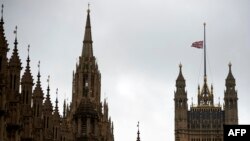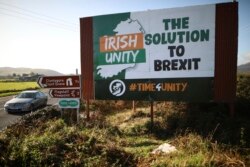Almost whatever happens Dec. 12, after Britons have voted for the third time in almost four years in a general election, the country is likely to emerge even more disunited than before, analysts and commentators worry.
The vote may well mark an important stage in the unpacking of the union of Great Britain and Northern Ireland, otherwise known as the United Kingdom, they say. According to the five living former British prime ministers, the turmoil caused by Brexit has plunged Britain into an existential crisis, and has turned the upcoming poll into the most consequential British election of modern times.
If Prime Minister Boris Johnson’s Conservatives win, Northern Ireland will end up being pushed closer to the Republic of Ireland, thanks to the most recent Brexit deal negotiated with the European Union that would align the British-run province with EU rules on food safety and other standards. That would require customs officials to check goods entering Northern Ireland from mainland Britain.
Meanwhile, if Jeremy Corbyn, seen as Labour’s most left-wing leader since the 1920s ends up in Downing Street, it will likely be thanks to support from the Scottish Nationalist Party. That party has made clear its price will be another Scottish independence referendum, which stands a high chance this time of passing, unlike the poll in 2014. Few pollsters believe Labour can win enough seats to form a majority government. Nicola Sturgeon, the SNP leader and Scotland’s first minister -- the head of the Scottish government -- said she was sure Corbyn would agree to another independence plebiscite if he becomes prime minister.
He may not have any choice. Some veteran politicians, including former Prime Ministers Tony Blair and John Major, worried even before the 2016 British referendum on European Union membership that the plebiscite could well set in motion the conditions for a break-up of the United Kingdom. With large majorities in Scotland and Northern Ireland opposed to Brexit, the writing was on the wall, they said.
Blair warned that at the very least it would “completely change the dynamic of Scottish independence.” He and others said the demand for a second independence referendum would be “unstoppable” if the Scottish pro-European views are discounted.
That is what the SNP hopes will happen, and as a electoral beneficiary of nearly four years of Brexit chaos in Westminster, Sturgeon said the demand for a Scottish independence referendum will become “irresistible" if her party wins the majority of Scottish seats in the general election, which is highly likely. Unionists won the 2014 independence referendum by 55 percent to 45 percent.
A string of opinion polls recently has shown the political landscape is being reshaped by the Brexit impasse, with surveys suggesting that a narrow majority of just over 50% favoring Scottish secession. Significantly, more people than not say Scotland would be wealthier and better off inside the EU and outside Britain.
In October, undeterred by damp and rain more than 200,000 pro-independence Scots marched in Edinburgh demanding secession. The Institute for Government, a London think tank, has argued it would be politically unsustainable to deny Scotland a second independence referendum, if Scots vote in December for parties supporting one. In a report it said: “If the union is to survive, it must be because a majority of people in all four parts of the U.K. are persuaded that its survival is for the best, not because Westminster wields the power… to hold the nations… together against their will.”
The political dynamic is changing In Northern Ireland too, and reunion with the Irish Republic is becoming more talked about, partly due to mounting anger over Brexit combined with changing demographics, analysts say. By 2021 the province’s Catholics, who tend to support reunification, will outnumber Protestants, who tend to be unionist, according political scientist Paul Nolan. He said that while Catholics don’t automatically want reunion, it will be important for the London government to ensure they are “not alienated by any form of triumphalism or anything that seems to be a rejection of their cultural identity as nationalists.”
Northern Ireland’s unionists worry that the Brexit deal Johnson negotiated with Brussels — the second exit agreement struck — will in effect start peeling the province away.
In September, for the first time, an opinion survey found that a slim majority in Northern Ireland favored reunion with the Irish Republic.
On Thursday, the second day of official electioneering, Johnson acknowledged that this election is the most important for a generation, and not only because it will determine whether his Brexit deal ultimately secures the full backing of Parliament afterward. Campaigning in Scotland, he said, “Only a vote for the Conservatives will stop the SNP’s plans to break up the U.K., the most fantastic and successful political union in the world. I will never give up on our incredible union.”
Even a Conservative victory won’t ensure Scotland stays in the union, though. Some commentators say a Johnson win would end up sealing Scotland’s departure by deepening Brexit grievances and giving greater weight to the SNP’s case for another referendum.
The English increasingly don’t seem to care, including even Conservative party members. A majority of Conservatives said in a July opinion poll that they'd rather Brexit took place, even if it led to Scotland and Northern Ireland breaking away.
Would it matter if Britain broke up and was reduced to a residual core of England and Wales? England’s GDP would remain in the world’s top 10, according to economists, although that could depend in part on how it finally exits the EU and what free trade deals it strikes with the EU, its largest trading partner, and with others, notably the U.S.
However, how it would relate to the rest of the world aside from commerce would partly depend on whether it emerged in an isolationist mood, more "Little England," or as a buccaneering, outward-looking nation, determined to engage politically and to continue to punch above its weight.
According to Tim Oliver of Britain’s Loughborough University, and author of “Understanding Brexit: A Concise Introduction,” a breakup would raise serious questions about England’s military status because of a splitting up of military assets and personnel among Britain's constituent parts, affecting its wider geopolitical role, its influence in NATO and its importance as a key U.S. ally.
“A potential loss would be the U.K.’s nuclear weapons, currently based in Scotland and for which there exists no immediately viable alternative location in England. Whether nuclear status would boost England’s (like the U.K.’s) claim to being a great power is debatable, but much ink will be spilt by English commentators and decision makers over what the loss or reduction in nuclear power status means,” he wrote in a paper for the London School of Economics.
Another unanswered question would be over whether England inherits the Britain’s permanent U.N. Security Council seat, which could be difficult with other established powers, such as Germany, and rising powers interested in securing a seat.






